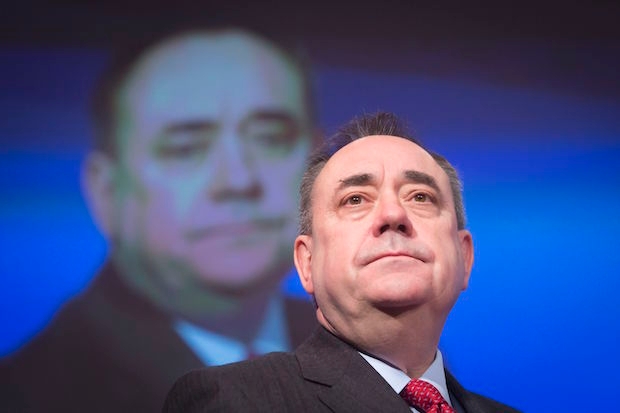Alex Salmond has been oddly absent from the SNP’s spring conference this weekend. Although the former First Minister’s only official positions are as the MSP for Aberdeenshire East and the PPC for Gordon, it’s puzzling why one of the party’s most prominent figures wasn’t given a prime speaking slot. But that didn’t stop him from trying to steal the show. A small stage was setup in the hall for a Q&A session to promote his new book at lunchtime today. But as soon as Salmond arrived, a combination of sound issues and the ecstatic crowd led him to give up on the side stage and invade the main platform. As the video shows, he had no qualms about strolling into the limelight.
Incredible – Alex Salmond quits the small Q&A stage to take to the main stage. Watch: #SNPConf pic.twitter.com/nqmFZEV1RJ
— Sebastian Payne (@SebastianEPayne) March 29, 2015
This was the first time I’ve seen Salmond address the party faithful and I was struck by the cultish nature of the questioning. While Nicola Sturgeon doled out softer rhetoric yesterday about ‘friendship’ with the rest of the United Kingdom, it was business as usual from Salmond.
He made at least four attacks on the press: hitting out at the ‘metropolitan media’ for its coverage of the referendum, claimed that the BBC was unduly influenced by ‘headlines from a biased press’ and repeatedly encouraged the audience to buy the pro-independence newspaper The National, whose recent launch he described as a ‘great move forward’. One of the biggest cheers came from a Nat who told Salmond he had cancelled his license fee in protest at the BBC’s referendum coverage.
There was a little humility: Salmond admitted that ‘any mistakes the Yes campaign made were my responsibility’ but insisted he takes a ‘glass half full approach’ over the campaign (presumably of pink champagne). The Bank of England governor Mark Carney apparently played the referendum with a straight bat but the permanent secretary to the Treasury Nicholas Macpherson did not. And when asked about being a Tory pinup, Salmond described the campaign as ‘stupid’.
Given the comments by Sturgeon on who will lead any SNP coalition or pact negotiations after the election, it’s clear there is some tension between the pair. Based on his turn today, the former First Minister is representing and appealing to the more cultish side of the SNP, who feel the referendum was unfairly snatched away from them, while the present SNP leader looks as if she is trying to move the party in a more professional direction.






Comments